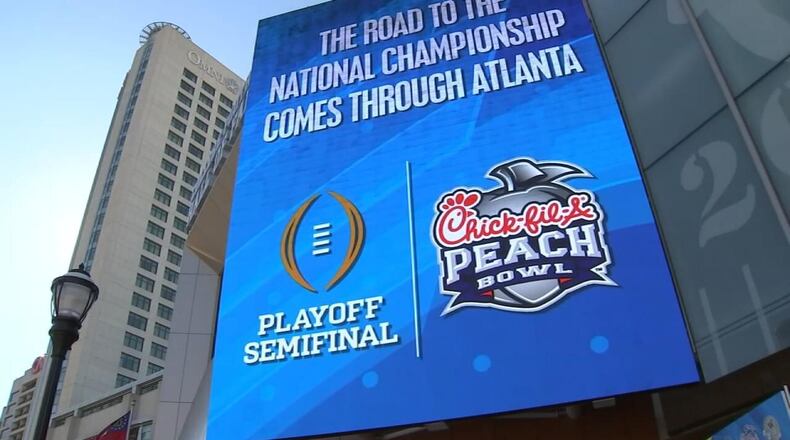Hosting the Chick-fil-A Peach Bowl isn’t as simple as being told what two teams are playing, buying thousands of chicken sandwiches, selling tickets and then watching the fun.
It’s a complex undertaking that takes a year of planning, surveys, conversations among the 15 people on the staff of the bowl, but also the game’s sponsors, partners and agencies around the state to make sure that the more than 40,000 in attendance, the players, the coaches, the band members, the equipment managers, the 600 volunteers and the thousands more who come just to be around the action enjoy the experience.
The good thing for the Peach Bowl, according to CEO and President Gary Stokan, is that it has a lot of experience. In addition to the Peach Bowl, which this year will feature No. 1 Georgia vs. No. 4 Ohio State in the College Football Playoff national semifinals on Saturday, it also hosts the annual Chick-fil-A Kickoff game or games. Among the three games, five of the six teams were ranked No. 11 or higher, so big crowds are the norm.
“Great example of teamwork of people who understand sports,” he said.
The prepping for this year’s Peach Bowl began while last year’s, in which Michigan State defeated Pittsburgh, was being played. Those who attended were surveyed about their experiences during the days before the game and the experience at the game. Everyone involved with the two teams are also surveyed.
In January, some staff members went to East Lansing, Mich., and Pittsburgh to the campuses to begin interviewing everyone from the school president to the equipment manager to the band director to assess what Stokan described as “the good, bad and the ugly” because they are customers, too.
An example of change from those interviews is the addition of the team walks into the stadium to mimic the game-day traditions that almost every college has incorporated. When Georgia played, fans were encouraged to hold up their cellphones in the third quarter to mimic the experience at Sanford Stadium.
The Peach Bowl also gave up giving gifts to players. Instead, they now give the players on the teams $400 gift cards, a watch and a football that their teammates can sign and keep for posterity.
Stokan said the players appreciated the gift cards rather than something like an Xbox. He said a few told him they were able to buy Christmas gifts for family members with the money.
The Peach Bowl staff also did an internal analysis of strengths and weaknesses in which it went over all the information it gathered, including surveys from sponsors and TV partners. It also met with Mercedes-Benz Stadium members, who Stokan said are crucial partners.
The budget for Saturday’s game was put together in February and put in front of the Peach Bowl’s board of directors in March. As that budget was being finalized, the financial books were closed on the previous game. The Peach Bowl staff also put together its annual golf tournament, which features coaches and personalities from around the country.
April continued with meeting with the other bowl games to compare the successes of events around the games, game-day operations and marketing. Members of the Peach Bowl staff also met with the College Football Playoff board and ESPN.
While the staff is working year-round to put on the bowl, there are also volunteers who give up their holidays to work. There are 603 volunteers who average 8.2 years of service and work 1,635 combined shifts during Peach Bowl week.
Albert Tarica has been with the bowl, first as a volunteer and now a member of its board of trustees, for the past 54 years.
“I told my wife I would just be a volunteer until it wasn’t fun anymore,” he said. “It’s been fun.”
This process is repeated every year.
“Lot of teamwork, lot of communication, lot of meetings,” Stokan said. “But we’ve had a lot of practice.”
About the Author
Keep Reading
The Latest
Featured


